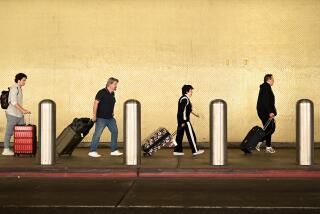EXECUTIVE TRAVEL : Survival Tips for Harried Business Fliers
- Share via
With American Airlines trying to get back to full strength as travelers wade into the heaviest part of the holiday schedule, even the most veteran of frequent business fliers are finding their patience tested.
Strikes, inclement weather, mechanical problems and hordes of stressed-out leisure travelers can all get in the way of flying to a meeting and back.
Here are some tips for business travelers culled from corporate travel agents, frequent fliers, the National Air Transport Assn. in Washington and the National Assn. of Travel Agents, also in Washington.
Carry a pocket copy of the “Official Airlines Guide” (available at most airport newsstands).
If your flight is canceled, you may be able to find an alternate flight on your own quickly and beat the rush to the next agent.
If there’s a line at the reservations desk and you’re pressed for time, go to a pay phone and call the airline. This puts you at the head of the line. “If there’s a scramble for seats, you can grab one quicker on the phone,” said one frequent flyer.
Make a backup reservation on an alternate airline. Make sure when you are double-booking, however, that you know when you must cancel the reservation or have your travel agent void the ticket to avoid paying for it.
If you fly routinely to a particular destination, consider routinely double-booking as an insurance policy, then use your second ticket for a future trip. Most airlines will reissue full-fare tickets for a nominal cancellation fee.
Remember that because most business travelers have paid full fare, you are more likely to get the next available seat on an alternate carrier. Those with discount fares are more likely to have to fly standby, since the new airline gets a smaller reimbursement for honoring those tickets.
Watch the news. If you see stories indicating a possible disruption, change your flights or double-book. Corporate travel agents report that many of their clients elected to stay away from American Airlines weeks before the strike as a precaution. Even those who were loyal to the airline because of frequent-flier plans did more double-booking than usual.
Use your travel agent. Let your agency know you want to be called as soon as they know of any changes in flight schedules. Also, some agencies have special lines to the airlines that they can call to request emergency help. “Sometimes we can call the airline and say it’s an emergency and they will have a space that hasn’t been released yet on the computer,” said Lee Viksten of Uniglobe Galaxy Travel in Pasadena, which handles corporate travel accounts.
Find out if your travel agent has an 800 number or special desk you can call if you are stranded. Some have help lines that are staffed 24 hours a day to assist clients.
During peak travel seasons or in bad weather, arrive at least an hour earlier than usual.
Travel light. Keeping your bags with you means lost baggage is one less thing to worry about.
Always use a credit card to pay for your ticket. Many card companies will not post your account for services not rendered, which means you won’t be charged for a canceled flight.
Try to get a boarding pass or seat assignment in advance as extra insurance to avoid being caught holding the bag on a flight that’s been overbooked. This is especially true this season as cancellations and increased double-booking may have created more uncertainty.
Use business lounges. In addition to offering refreshments and newspapers, many now make it easier to use computers.
If you’re within a few hours of your destination, consider renting a car or taking the train to avoid getting stuck in an airport.
The most important coping strategy of all during high-stress travel times, however, is in what you pack, said Emily Porter, spokeswoman for the American Assn. of Travel Agents. “Bring a book and a sense of humor.”
More to Read
Sign up for The Wild
We’ll help you find the best places to hike, bike and run, as well as the perfect silent spots for meditation and yoga.
You may occasionally receive promotional content from the Los Angeles Times.






